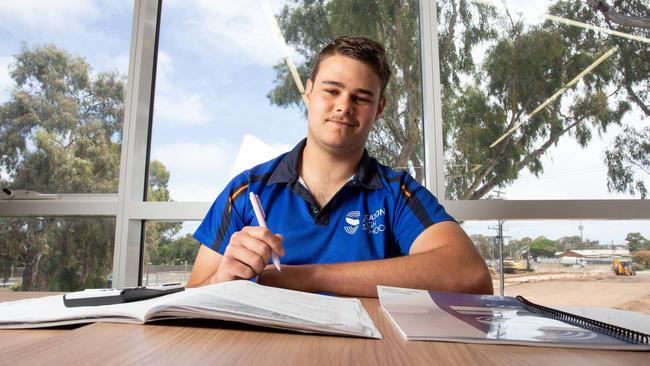SA public school students being expelled, suspended amid surge of anti-social behaviour
The number of SA public school students being ejected from the classroom has hit record levels. See where your school ranks.
Education
Don't miss out on the headlines from Education. Followed categories will be added to My News.
Teachers are ejecting students from the classroom in record numbers as new data shows suspensions and exclusions at public schools have soared to almost 5000 in a term.
Analysis has also revealed the schools where the most students have been sent home for poor behaviour – which can include physical violence, threats verbal abuse and being disruptive -over the past decade.
The top seven schools are in Adelaide’s north.
Paralowie School ranked at number one, suspending or excluding 962 students from its Reception to Year 12 campus between 2012 and 2022.
Mark Oliphant College, a Birth to Year 12 school in Munno Para West, ranked second (934).
Last year alone the college suspended 152 students – almost double the 83 students ejected in 2021.
In comparison, Carlton School in Port Augusta took a decade to suspend 152 students.
While 2023 data is not available, the trend at Mark Oliphant College is likely to continue after a series of violent incidents involving students were reported earlier this year.
Mark Oliphant College principal Kerry Williams said in February the school had invested in “restorative practices training” in the past two years and had engaged external agencies to support students and families.
The Education Department has released the data under Freedom of Information laws.
It provides a snapshot of every public school’s suspensions and exclusions in the 10 weeks of Term 2 of each year. The department does not provide full year figures.
The total number of students sent home for poor behaviour has hovered between about 3600 and 3800 each year over the past decade, including during the Covid-19 affected years of 2020 and 2021.
However it spiked to 4967 students in 2022.
Education Minister Blair Boyer said suspension was used as “a last resort” by teachers when a student’s behaviour affected the safety of others.
Mr Boyer said he had introduced initiatives to address the “underlying causes of disruptive behaviour” to reduce the rate of suspensions and exclusions.
These included banning mobile phones in classrooms, placing autism teachers in every primary school and deploying mental health specialists to 65 schools.
A $12.25m investment in 12 schools “where there are higher levels of reported incidents” had already led to a 32 per cent drop in violent episodes, he said.
The Education Department is also reviewing its suspension and exclusion policy.
Opposition education spokesman John Gardner said a 2020 report, released while he was education minister, found a small number of students were being repeatedly sent home and accounted for large numbers of suspensions.
Changes were put in place to act on the report’s recommendations, Mr Gardner said.
“If we can better support these students to engage with their learning then not only will they be more likely to finish school … but also their classrooms will become less disrupted,” he said.

Between 2012 and 2022 at least 20 schools recorded just one suspension or exclusion and almost 120 schools recorded fewer than 10.
John Pirie Secondary School was the regional school to eject the most students (581) followed by Willunga High School (574), while Woodville High School (559) completed the top 10.
However, some school leaders have managed to significantly reduce rates over time.
For example, annual suspensions at John Pirie Secondary School fell from 91 in 2013 to 60 last year.
At Risdon Park Primary School there were 23 suspensions in 2015 but only five in 2022.

How Cameron regained focus
By Agnes Gichuhi
In the wake of alarming statistics that reveal the number suspensions and exclusions at public schools have soared, Cameron James found a life-changing program that reignited his passion for school.
Cameron is among about 4000 students across 81 public schools in the state government’s Flexible Learning Options (FLO) program that helps students who are at risk of disengaging from education.
The 17-year-old said he found the “mainstream” school environment “quite difficult”, and only enjoyed physical education, science classes and spending time with friends at recess and lunch.
“When you’re in a class full of other people that are trying to learn the same thing, it can be quite difficult to cater for each student needs,” the 17-year-old from Semaphore said.
Cameron said factors such as boredom and sitting for long periods of times lead to students “getting in trouble” at school.
“I’ve seen many suspensions. They (students) must have been bored because they were mucking around with their friends, not listening to the teacher, doing their own thing,” he said.
“Sitting down for a long period of time, you’re going to build up a lot of energy and if you don’t have anywhere to release that energy, you’re going to start misbehaving.”

Cameron said “having more breaks in the middle of a class,” so students could go “outside for a walk and release some energy,” could lead to more positive outcomes.
“Once they come back inside, they’re going to be ready to learn again,” he said.
The government committed more than $5m as part of a redesign of the FLO strategy that identified ways of leveraging effective existing practices, particularly allowing students to access their learning program flexibly at the school, alongside mainstream subjects and peers.

Youth worker Benjamin Cailler, 35, of Flinders Park, said the program has resulted in the “best schooling year” Cameron had ever had.
“He’s learning really well and he knows he’s got people around him that are invested in his outcome,” Mr Cailler said.
“He’s shown that throughout the year in all the different activities that he’s done.




